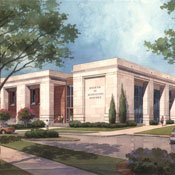The total cost of a proposed Mississippi civil-rights museum could depend on its location. While Gov. Haley Barbour and a majority of the state House of Representatives have backed a site in downtown Jackson, a competing bill passed last week by the Senate allows for other, costlier locations.
Last week, the Senate passed SB 3098, which would provide $15 million in state bond funds for the civil-rights museum, on the condition that supporters of the museum also raise $15 million in outside funds. The bill also would provide another $15 million for a Mississippi history museum. The version the full chamber passed was stingier than the Jackson Sen. John Horhn's original, which offered $30 million to the civil-rights museum and $18 million for the state history museum, along with $7 million for a parking garage to serve the facilities.
Horhn's original proposal was nearly identical to the version House lawmakers approved Feb. 16, except for one major distinction: The House measure, HB 1463, mandated that the civil-rights museum be located adjacent to the state history museum in downtown Jackson.
The Senate bill's flexibility on a location for the civil-rights museum again opens the possibility of building the facility on the campus of Tougaloo College. In 2008, after a highly contentious selection process, an earlier governor-appointed commission picked Tougaloo as the site of a proposed state civil-rights museum. The project lost steam after the initial announcement, however. Tougaloo President Beverly Hogan did not return a request for comment, but in a Jan. 17 statement, she said Barbour failed to appoint a board of directors for the non-profit organization that would oversee the museum's initial fundraising, construction and operations.
Locating the civil-rights museum is attractive to many Jackson lawmakers and officials because of the boost it could provide to tourism. But the downtown location could also keep the civil-rights museum's price tag lower, Mississippi Department of Archives and History Director Hank Holmes said.
Since 2001, the MDAH has eyed a site on North Street, adjacent to the current Archives building, as the future home of a state history museum. One advantage of the location is that the state has already constructed a physical plant at Amite and Jefferson streets to provide heating and air conditioning for a number of state-owned buildings. Built for a now-scrapped plan to move the state Supreme Court and the Library Commission, the plant has the capacity to serve additional buildings, Holmes said.
Holmes said locating the civil-rights and history museums next to each other could provide additional major savings. The two facilities could share a lobby, reception desk and gift shop, along with the employees to manage those common areas. More significantly, they could share the extensive, environmentally controlled storage space necessary to support the various exhibits and artifacts.
It would be a fitting arrangement for two museums that have distinct, if related, missions.
"The state history museum--one of the stories it will tell, or threads, is civil rights," Holmes said. "But it is one aspect of Mississippi history, one of many that we'll be dealing with. So we cannot go into great detail, educating the visitors about the importance of the Civil Rights Movement. A civil-rights museum--it would have only that one theme. It would have a definite time period to cover, so it could provide a great deal more information, a great deal more opportunity for reflection on an (era) that was central to American history."
Previous Comments
- ID
- 162383
- Comment
I like the HB 1463 for all the reasons given. Next door to the Winter building where the state official records are already housed is the proper site. The Tougaloo Civil Rights collection is currently housed there as well although it is the property of the college. Many civil rights sites are within walking distance such as the old municipal library where the Tougaloo Nine protested their exclusion from using the main branch resources. The Sears Building now the Welty Library was one of the sites of the black saturday protest just prior to Medgar Ever's assassination.
- Author
- Aeroscout
- Date
- 2011-03-03T09:07:54-06:00
- ID
- 162387
- Comment
Why would sites other than those downtown even be under consideration? For a tourist, it would be easy to get to a downtown site, whereas a site at Tougaloo would involve driving to get there. Not all tourists have cars at their disposal and compelling them to use a taxi is not a tourist-friendly action. Concentrating tourist amenities in one area makes economic sense.
- Author
- tombarnes
- Date
- 2011-03-03T12:49:19-06:00



Comments
Use the comment form below to begin a discussion about this content.
comments powered by Disqus